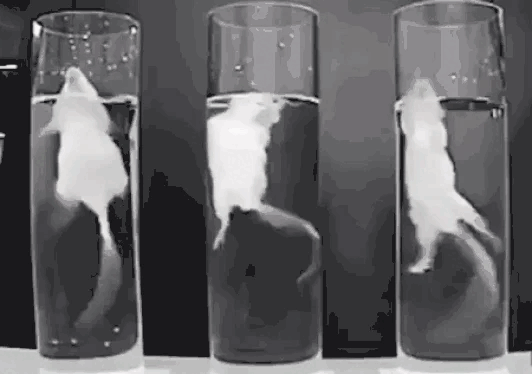UN INT Intro Text w/ Responsive Image - *Important Note* You must UNLINK this shared library component before making page-specific customizations.
Instead of Curing Psychiatric Diseases, NIMH Conducts Psychopathic Experiments
NIMH estimates that 20% of U.S. adults—about 57.8 million people—suffer from mental illness. Yet in 2021, fewer than half received treatment. ☹️ New drug developments have failed. Most treatments haven’t improved since their development 50 years ago, and many have unpleasant side effects and don’t work for everyone. 😒
Progress has stalled—partly ’cause of NIMH’s obsession with conducting experiments on animals, like the following:
-
NIMH experimenters put mice through the agonizing “forced swim,” “tail suspension,” and “footshock” tests in an attempt to study human depression. 😰 🐭 They force mice to swim for their lives in beakers of water with no way to escape, suspend them upside down by their tails, and trap them in a chamber with an electrified floor that gives repeated shocks to their feet. 😱
-
NIMH Director Joshua Gordon has personally put mice through a “social defeat” test in which one animal keeps attacking another.
These cruel tests haven’t produced a single treatment for humans with mental illnesses—they just cause intense terror, anxiety, and helplessness in mice. 😡

Brain-Damaged Monkeys Aren’t Stand-Ins for Humans
NIMH experimenter Elisabeth Murray cuts open monkeys’ skulls and injects toxins into their brains—or suctions out chunks. 😭 🐒 She then sticks the now brain-damaged monkeys in tiny cages, terrifies them with fake snakes and spiders to see how they react, and later kills them. Murray has legit wasted 30 years and $50 billion in taxpayer money but still hasn’t produced a single useful cure or treatment for either humans or monkeys. 🤦 We can only imagine how traumatizing these experiments are for those monkeys. 😟
Sex, Power, and Taxpayer-Funded Quackery
Absurd NIMH-funded experimenters at Duke University in North Carolina used monkeys to study “sex and power in advertising.” 🤨 The monkeys were forced to choose brand logos that were paired with images of sexually receptive female monkeys—and were deprived of water to encourage their “cooperation.” So what did NIMH find out from this experiment? Sex sells. That’s it. 😑

NIMH Has a Muddled Memory
Published studies by NIMH have found that other animals obvi aren’t good models for human afflictions, yet the agency keeps tormenting them while human patients suffer. ❓ ❓
“None of these [animal] models can accurately reflect the human condition. … Mice are not people. Mice do not have schizophrenia or anxiety.”
—Joshua Gordon, M.D., Ph.D., current NIMH director (Source)
“I spent 13 years at NIMH really pushing on the neuroscience and genetics of mental disorders, and when I look back on that I realize that while I think I succeeded at getting lots of really cool papers published by cool scientists at fairly large costs—I think $20 billion—I don’t think we moved the needle in reducing suicide, reducing hospitalizations, improving recovery for the tens of millions of people who have mental illness.”
—Tom Insel, M.D., former NIMH director, 2002–2015 (Source)
Adding Insult to Injury
In an unsurprising twist, it turns out that torturing animals for a living may damage a person’s mental health. 🤷
Studies show that laboratory workers are prone to compassion fatigue, burnout, and traumatic stress due to constantly seeing pain and death inflicted upon animals. Depression, anxiety, hopelessness, guilt, and substance abuse are just a few of the other reported mental health issues that laboratory staff experience. 😓
Scientists Have Found a Better Way—Add Your Support
Why is a government agency that says it’s dedicated to improving mental health carrying out experiments that literally derail animals’ mental health? 🤔 Scientists across the country are using modern tech advances—like brain organoids, brains-on-a-chip, human brain imaging, and tissue analysis—to learn more about human brain conditions without harming animals. ☝️
Please sign our letter to the NIMH Advisory Council urging it to redirect funds away from pointless animal experiments and toward modern, human-relevant research. Animals deserve to avoid suffering—and we deserve effective mental health treatments! 👏 ❤️